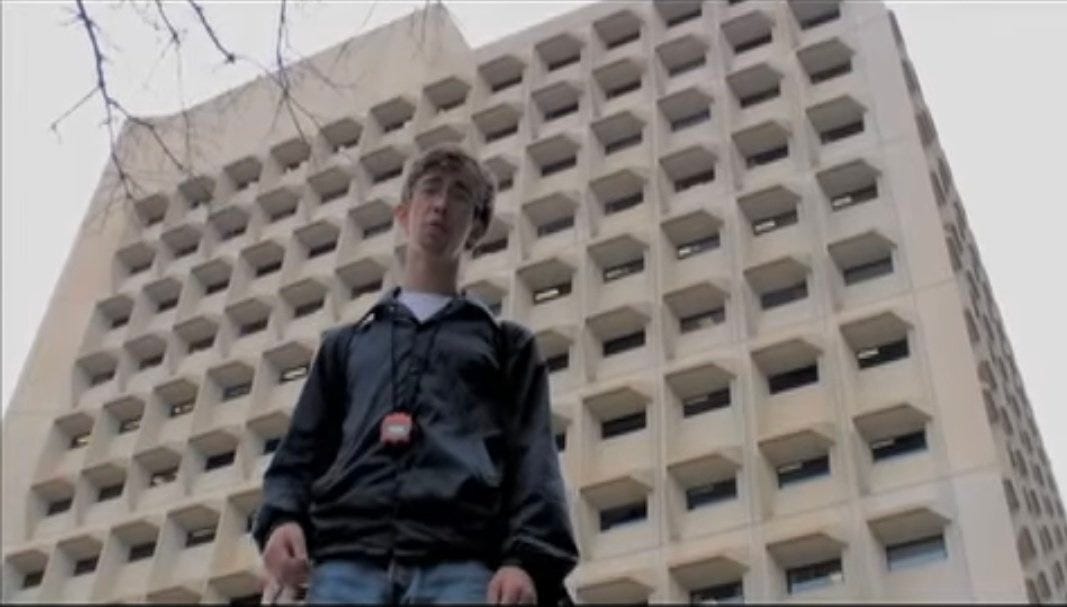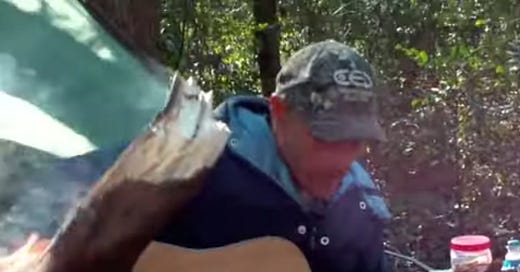Why do people have to live outside?
Here's what happens when you ask innocent questions about homelessness
An Oklahoma City death metal band called Chat Pile put out a viscerally upsetting album last year called God’s Country. One of the songs is called “Why,” and it starts like this:
Why do people have to live outside
In the brutal heat or when it's below freezing?
There are people that are made to live outside
Why?
Why do people have to live outside
When there are buildings all around us
With heat on and no one inside?
Why?
The song sounds like Bobcat Goldthwait ranting over a Slipknot bass line, interspersed with a tornado siren near the end. It’s ugly and frightening and it’s one of my favorite pieces of art from 2022.
I realize it’s a weird thing to say about an album suffused with human and animal suffering, with the infamously lethal Oklahoma County Detention Center on its cover, with lyrics from the perspectives of serial killers and people suffering psychotic breaks, but one thing I appreciate about God’s Country is its glimpses of innocence.
“Why do people have to live outside?” is an innocent question, and the singer forces us to sit with it.
Why? No, really, why?
You could answer earnestly in at least two ways. On the one hand, you could try to give an analysis of the root causes of homelessness in the United States (crushing economic inequality, systemic and environmental racism, crumbling state foster care systems, anti-tenant housing policy, chronic unemployment as a necessary spoke on the boom-and-bust wheel of capitalism, the way our weak regulators bow down at the feet of predatory payday lenders, the criminalization of drug use, the failures of private and religious and nonprofit interventions, the mass recruitment and abandonment of soldiers from impoverished neighborhoods, the tides of gentrification and decay in urban centers, the collapse of the healthcare system in rural communities, the flight of capital in the era of globalization, the decimation of unions, the mania of individualism, the deinstitutionalization of people suffering from mental illness with no alternative paths provided to mental wellness, the dismantling of the New Deal welfare state since the Reagan administration, the privations of a police-carceral state that offers shelter in the form of a cage and counseling in the form of a baton to the skull).1
On the other hand you could try to answer it as a moral question: Why, in the wealthiest society in human history, do we allow people to suffer in this particular and abject way? People have asked the same question about God and ended up atheists.
Why do people have to live outside? Why?
When I say it’s an innocent question, I don’t mean that it isn’t loaded. I mean that it’s earnest, maybe even naive. It’s the kind of question a child would ask. Innocent questions can be fruitful when we actually try to answer them.
I spent a good part of my college career out on the ledge of youthful naivete. I studied print journalism at the University of South Carolina in Columbia, which at the time had the highest homeless population of any city in my state. I saw, talked to, interviewed, prayed with, and shared meals with homeless people often. I did my best to listen, and what I heard changed my life.
I met people who were rationing insulin and bathing in the river, who were too ashamed to call their children, who had been driven to sex work, who had woken up in the night with their tent on fire and their only belongings stolen, who had been pelted with frozen paintballs in the winter by frat boys, who had suffered grisly injuries working at the chicken processing plant across the river, who had endured violence at the hands of their parents and their partners and their bosses and the cops.
I was innocent then, and asking innocent questions, such as “What is it like to be homeless here?” This led me to do dangerously naive things.

In March of 2010, during the spring break of my junior year, my roommate Matt and I decided to live outside in Columbia for a few days. I made a blog about it, Homeless in Columbia, that ended up being republished by Huffington Post through an improbable series of chance encounters. We didn’t make any money off of it, but it reached a wider audience than we had planned for.
I haven’t revisited that blog in years. Reading over it again today, I cringed several times, but I was glad that my college-undergrad self at least had the humility to admit the artificiality of the project. This is from a post on Feb. 8, 2010:
Even when I am living on the streets, I will be far from homeless.
As several people have pointed out in the past week — some more subtly than others — I’m just some privileged white kid who thinks he can urban-camp for a week and understand what it’s like to be homeless. Point taken …
I am not mentally disabled. I am not heartbroken. I am not an Army veteran with PTSD. But these are key elements of so many homeless stories I have heard already.
Before we embarked, Matt and I decided to do a trial run. We bundled up for a cold night, walked out of our apartment, and tried to sleep in a park downtown. We were almost immediately approached by three guys in bandanas who pulled guns on us and told us to empty our pockets. Seeing we had nothing valuable on us, one of them pistol-whipped Matt while another leveled what looked like a sawed-off shotgun at my chest. They left as quickly as they came.
My innocent questions had almost gotten us killed. I was an idiot for doing what I had done, and several elders in my life at the time said it in more or less polite terms.
Against better judgment we went out again for several nights during Spring Break, this time accompanied by several homeless people I’d gotten to know via a weekly homeless ministry. They protected us and kept us from making any more stupid mistakes. We slept outside, at the gospel mission, and at the winter warming shelter, which wasn’t at capacity at the time. We walked to the library every day so I could write my little blog on a computer there.
I didn’t come away with any new or groundbreaking insights. I did get to tell a few worthwhile stories, like when my friend Dawn made the gut-wrenching decision to take a job with a traveling carnival so she could get back on her feet and regain custody of her kids, or when the winter shelter closed in April and more than 200 people flooded out onto streets where it was illegal to sleep. One of the posts I wrote, about the indignity people felt when they couldn’t clean their clothes or bodies, ended up being part of the fundraising pitch for a Catholic charity that opened a free laundry and shower facility called Clean of Heart. It’s still there.
I’ll never be as innocent as I was then, or as sure of myself. You’d have to be insane or in your early 20s to think a little homeless experiment would make any kind of material difference in the world. And yet.
One thing I’ve come to appreciate as a parent is that my children are not yet acclimated to The Way Things Are. They don’t believe this is The Way Things Have to Be. They’ve started asking questions about the homeless people in our neighborhood and at intersections around the city begging for help. They’ve been with me when we stopped to help, and they’ve seen me steer them away when a situation didn’t feel safe. Their questions are innocent and kindhearted, and even though I thought I had the answers worked out, I still struggle to answer.
Why do people have to live outside? Why? Why?
Brutal South is a free weekly newsletter about class struggle and education in the American South. If you would like to support my work and get access to the complete archive of subscriber-only stuff, paid subscriptions are $5 a month.
Bookshop // Twitter // Bandcamp // Spotify Podcasts // Apple Podcasts
If you’d like a more clinical set of answers, the NIH has a pretty good short history of U.S. homelessness that you can read online.




Paul, when my son was attending a private hippie school in Atlanta he went with his biology teacher on a homeless project program. It was written up in the NY Times and was very controversial. She and three other parents had a two week homeless immersion program where the kids (ten in all) slept outdoors in a playground. They were allowed one sleeping bag and one plastic bag. During the day they looked for work, visited downtown shelters and traveled by foot. They were given 5 dollars a day, I believe, for daily work and sometimes they didn't get paid at all. The kids had to apply to the program by writing an essay as to why they wanted to do this. Like you our family was very involved in homeless ministry programs with our church. I was proud of my son but he was the one who was already empathetic and asking those questions. I think he grew up with empathy, a value that was most important to us for our children.
I love this piece. TY for writing it.